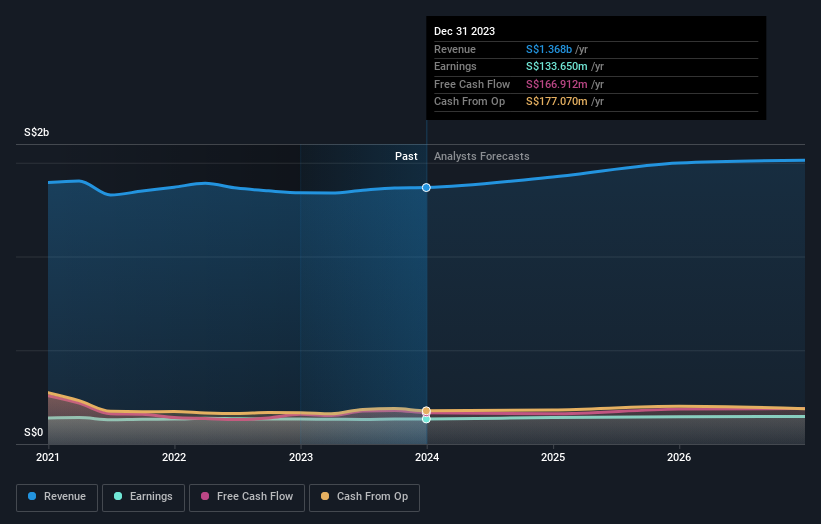Sheng Siong Group Ltd's (SGX:OV8) top owners are retail investors with 34% stake, while 30% is held by private companies
Key Insights
Significant control over Sheng Siong Group by retail investors implies that the general public has more power to influence management and governance-related decisions
A total of 4 investors have a majority stake in the company with 54% ownership
Every investor in Sheng Siong Group Ltd (SGX:OV8) should be aware of the most powerful shareholder groups. We can see that retail investors own the lion's share in the company with 34% ownership. That is, the group stands to benefit the most if the stock rises (or lose the most if there is a downturn).
And private companies on the other hand have a 30% ownership in the company.
Let's delve deeper into each type of owner of Sheng Siong Group, beginning with the chart below.
Check out our latest analysis for Sheng Siong Group
What Does The Institutional Ownership Tell Us About Sheng Siong Group?
Many institutions measure their performance against an index that approximates the local market. So they usually pay more attention to companies that are included in major indices.
Sheng Siong Group already has institutions on the share registry. Indeed, they own a respectable stake in the company. This suggests some credibility amongst professional investors. But we can't rely on that fact alone since institutions make bad investments sometimes, just like everyone does. It is not uncommon to see a big share price drop if two large institutional investors try to sell out of a stock at the same time. So it is worth checking the past earnings trajectory of Sheng Siong Group, (below). Of course, keep in mind that there are other factors to consider, too.
Sheng Siong Group is not owned by hedge funds. Looking at our data, we can see that the largest shareholder is Sheng Siong Holdings Pte. Ltd. with 30% of shares outstanding. Meanwhile, the second and third largest shareholders, hold 8.0% and 7.9%, of the shares outstanding, respectively. Two of the top three shareholders happen to be Top Key Executive and Member of the Board of Directors, respectively. That is, insiders feature higher up in the heirarchy of the company's top shareholders. In addition, we found that Hock Chee Lim, the CEO has 7.9% of the shares allocated to their name.
To make our study more interesting, we found that the top 4 shareholders control more than half of the company which implies that this group has considerable sway over the company's decision-making.
While it makes sense to study institutional ownership data for a company, it also makes sense to study analyst sentiments to know which way the wind is blowing. There are a reasonable number of analysts covering the stock, so it might be useful to find out their aggregate view on the future.
Insider Ownership Of Sheng Siong Group
The definition of company insiders can be subjective and does vary between jurisdictions. Our data reflects individual insiders, capturing board members at the very least. The company management answer to the board and the latter should represent the interests of shareholders. Notably, sometimes top-level managers are on the board themselves.
I generally consider insider ownership to be a good thing. However, on some occasions it makes it more difficult for other shareholders to hold the board accountable for decisions.
Our most recent data indicates that insiders own a reasonable proportion of Sheng Siong Group Ltd. It has a market capitalization of just S$2.3b, and insiders have S$562m worth of shares in their own names. That's quite significant. Most would say this shows a good degree of alignment with shareholders, especially in a company of this size. You can click here to see if those insiders have been buying or selling.
General Public Ownership
The general public-- including retail investors -- own 34% stake in the company, and hence can't easily be ignored. While this group can't necessarily call the shots, it can certainly have a real influence on how the company is run.
Private Company Ownership
We can see that Private Companies own 30%, of the shares on issue. Private companies may be related parties. Sometimes insiders have an interest in a public company through a holding in a private company, rather than in their own capacity as an individual. While it's hard to draw any broad stroke conclusions, it is worth noting as an area for further research.
Next Steps:
While it is well worth considering the different groups that own a company, there are other factors that are even more important. For example, we've discovered 1 warning sign for Sheng Siong Group that you should be aware of before investing here.
Ultimately the future is most important. You can access this free report on analyst forecasts for the company.
NB: Figures in this article are calculated using data from the last twelve months, which refer to the 12-month period ending on the last date of the month the financial statement is dated. This may not be consistent with full year annual report figures.
Have feedback on this article? Concerned about the content? Get in touch with us directly. Alternatively, email editorial-team (at) simplywallst.com.
This article by Simply Wall St is general in nature. We provide commentary based on historical data and analyst forecasts only using an unbiased methodology and our articles are not intended to be financial advice. It does not constitute a recommendation to buy or sell any stock, and does not take account of your objectives, or your financial situation. We aim to bring you long-term focused analysis driven by fundamental data. Note that our analysis may not factor in the latest price-sensitive company announcements or qualitative material. Simply Wall St has no position in any stocks mentioned.


